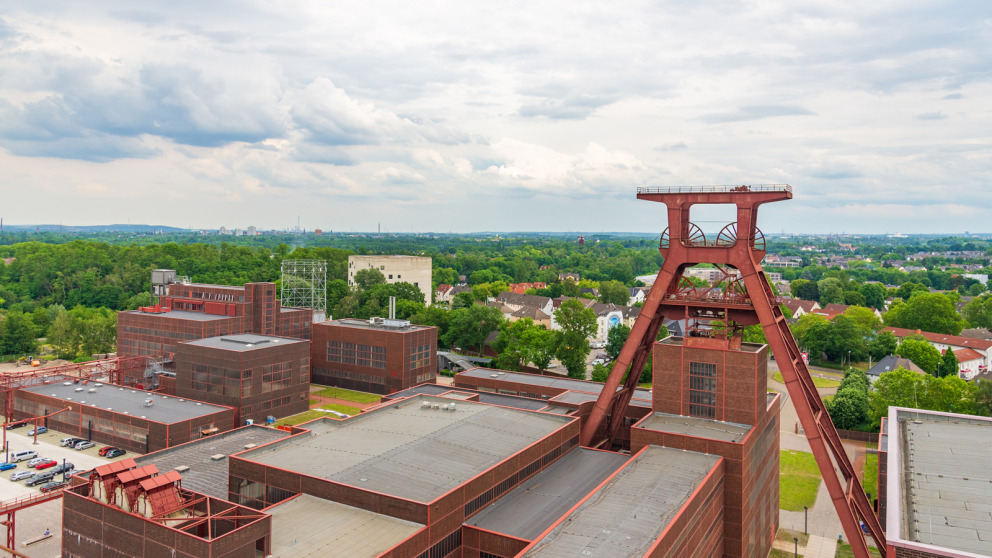Cities in Transition: Towards a Sustainable Future
28.06.2024
While the cities of Duisburg and Essen in Germany’s Ruhr Region have a similar history, their plans for a post-coal future diverge: Duisburg is building on its industrial heritage and hopes to establish itself as an international hub for logistics and hotspot for green hydrogen. Essen, on the other hand, has developed a green vision for the future that centres on sustainable enterprises and cultural events. Both pathways present their own opportunities and challenges.

The coal phase-out is a milestone in the energy transition, entailing considerable economic and social changes in the affected regions. In their investigation of the structural transformation processes unfolding in Duisburg and Essen, a team of scientists led by Franziska Mey (Research Institute for Sustainability – Helmholtz Centre Potsdam) applied the concept of positive social tipping points. The concept describes the point at which a change triggers a self-reinforcing dynamic or cascade of changes that results in significant, often abrupt and frequently irreversible system-wide effects - in this case, new economic and social development paths.
Tipping point yet to be reached
“Determining whether a tipping point has been reached requires a comprehensive analysis. In this case, we examined the transformations of Duisburg and Essen over the last thirty years: Which events and policy interventions were formative? What were their social and economic impacts in terms of employment trends, income levels and environmental quality, for example? We analyzed relevant literature and conducted interviews with decision-makers from both cities,” explains Franziska Mey.
The researchers found that neither city has reached a tipping point. However, both have laid the foundations for their future development pathways. The researchers identified demographic, economic, and policy changes that could lead to tipping points in the future.
Duisburg relies on the tried and tested, Essen wants change
The study describes the different visions of the future developed for Duisburg and Essen. Duisburg is striving to maintain and expand its industrial and logistics sectors, with a particular focus on the development of existing capacities, such as the steelworks and port, by adopting climate-neutral technologies and fostering green hydrogen infrastructure. According to the researchers, these decarbonization efforts will play a decisive role in deciding whether the city reaches a tipping point towards a sustainable future.
Essen has formulated an alternative vision for the city, departing from its old mining image towards a greener future. Adopting the motto “From grey to green”, it has aligned itself with contemporary national and European sustainability trends. Essen’s vision for the future focuses on sustainable companies and the city can boast a growing number of “green jobs”. It also promotes sustainable activities such as cycling and environmentally-friendly tourism.
Accelerating progress with the right timing
Essen is making somewhat faster progress than Duisburg, reports Mey: “We found minor social, economic and demographic differences between the cities, with Essen performing slightly better in all areas. Looking beyond the hard data, there is a clear shift in the city’s narratives: Essen has actively worked to shape a new vision and local narrative for its future development. The city has used major events to anchor sustainability trends in the local economy, it promotes civic engagement and has diversified its economic activities. This green agenda could mark the beginning of a new era of sustainable development in the city.” Radical changes and tipping points are rarely observed in the complex social systems of cities and change often unfolds gradually.
The study shows that while cities’ scope for action is constrained by a complex, multi-level political system, they can and do shape the course of transformation processes. Timing also plays a role: If cities intervene at the right moment, they can steer transformation processes more effectively - for example, by developing a shared vision of a sustainable future and shaping local narratives, harnessing and supporting the dynamics of local sustainability initiatives, promoting regional and supra-regional networks and encouraging the establishment of sustainable enterprises.
Mey, F., Weik, A., Lilliestam, J. (2024). From grey to green? Tipping a coal region incrementally. Global Environmental Change, 87: 102862. doi: 10.1016/j.gloenvcha.2024.102862.
Contact

